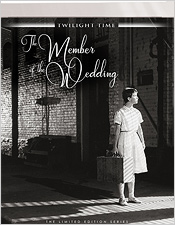Member of the Wedding, The (Blu-ray Review)

Director
Fred ZinnemannRelease Date(s)
1952 (June 14, 2016)Studio(s)
Columbia Pictures (Twilight Time)- Film/Program Grade: C+
- Video Grade: A
- Audio Grade: A
- Extras Grade: B
Review
The Member of the Wedding (1952) is one of those movies that, on the surface, seems to be a repudiation of the auteur theory: the product of three equally strong artistic personalities (playwright and novelist Carson McCullers, producer Stanley Kramer, and director Fred Zinnemann), it’s a handsomely mounted class act of a movie, beautifully photographed and engineered for maximum concision and clarity. Yet, with all due respect to its many champions, its multiple authors ultimately cancel each other out, leaving the movie to sit dead on the screen – it has everything a movie should, except a beating heart at its center. There’s just something too slick and homogenized about it after going through so many filters; it should have the force of a John Cassavetes or Maurice Pialat drama, but it lacks those directors’ fearlessness as well as their messiness.
To be fair, Cassavetes and Pialat didn’t have to deal with the censorship restrictions of the Production Code, which undoubtedly had a lot to do with the film’s timidity. In fact, what stands out about the film now is how resonant the story feels in terms of gender identity issues – its heroine, twelve-year old tomboy Frankie Addams, is as interested in girls as boys, and her young cousin John Henry sashays through one scene like a female model and enters another wearing a tutu. They, like most of the characters in the movie (particularly Frankie’s black maid and caretaker Berenice), ache with the loneliness of being on the outside of conventional society; Frankie’s coming of age story largely consists of the pain that comes with her failed attempts to transform herself from an outsider into an insider.
The movie’s greatest strength is McCullers’ incredibly observant eye for the details of adolescence; her depiction of Frankie’s awkwardness is both incredibly specific and totally universal. Unfortunately, this strength is almost completely undermined by an aspect of the film that has inexplicably been celebrated by many of its fans ever since its release: the grotesque miscasting of Julie Harris as Frankie. Harris made the role famous on stage and was thus brought over to the film adaptation; I can’t speak to how effective she was in the play, but on screen it is simply bizarre to watch a 26-year old woman pretending to be a 12-year old misfit. Frankie doesn’t just seem ill at ease, she seems positively deranged and unhinged, because she doesn’t come across as a socially inept kid – she comes across as an adult who ought to be institutionalized. Harris’s inappropriateness for the role destroys the veracity of just about every scene that she’s in, making The Member of the Wedding an interesting curiosity but not a great movie, in spite of the fact that on a technical level it is beyond reproach.
Thankfully, that technical proficiency is well served by the excellent Blu-ray transfer here, which will delight the many fans of this film who admittedly see a lot more greatness in it than I do. The tonal range of cinematographer Hal Mohr’s stunning black and white photography is impeccably preserved, and the source material is spotless. The uncompressed mono sound mix is solid as well, reproducing the dialogue and Alex North’s superb score with total clarity. (North’s score is available as an isolated track too.) The disc contains an array of supplements, the best of which is a casual but informative audio commentary by McCullers enthusiasts Suzanne Vega, Derek Botelho and David Del Valle; the worst is the other audio commentary, a repetitive and vacuous track by McCullers biographer Virginia Spencer Carr. Carr provides more useful tidbits in a featurette about the writer’s life and work that joins a similar featurette on adapting the play for the screen – this one is most interesting for its observations by actor Kevin Spacey, who succinctly explicates the differences between film and theater. A brief introduction by Stanley Kramer’s widow and a theatrical trailer round out the set.
- Jim Hemphill

